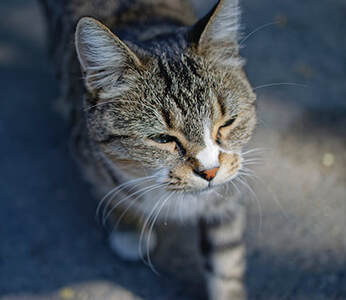
Like people, cats usually sneeze because their nasal passages are irritated. In most cases, it’s caused by a pollen allergy, chemical fumes associated with various household solvents, inhaled tobacco smoke, perfumes or foreign objects such as pieces of fur or grass.
Excessive sneezing, however, may signal a more serious issue. If your kitty sneezes many times in a row or continues to sneeze over the course of several days, bring her to the vet. She may be suffering from a viral, bacterial or fungal infection in her upper respiratory tract.
Dental disease can cause sneezing particularly if it involves a root infection. Such infections can allow bacteria to settle in her nasal sinuses resulting in inflammation and sneezing.
Feline herpes virus (FHV) may be another cause. Highly contagious between cats, it’s transmitted primarily through saliva, urine or feces, and eye or nose secretions. While there’s no cure for FHV, there are treatments that allow cats to live normal lives.
Feline Calicivirus (FCV) is also highly contagious between cats, passed in the same manner as FHV -- through bodily fluids. If your cat isn’t already vaccinated, consider doing so. In mild cases, FCV can be treated at home with prescribed medications. In more serious cases your vet may recommend leaving your cat at the hospital for a few days, and if yours is a multi-cat household, when she returns home, keep her quarantined from the other cats.
Feline Immunodeficiency Virus (FIV) is slow acting and your cat may not show symptoms until years after she’s been infected. FIV is typically transmitted through bite wounds or from pregnant mothers to their kittens. Sadly, there’s no cure for FIV, but your vet can treat any secondary infection as it arises, and with treatment, cats can live fairly normal lives. But left untreated, FIV can lead to kidney failure or cancer.
Chlamydiosis or feline chlamydia doesn’t require direct contact for infection. Bacteria from a sneeze or a cough can travel across a room or be passed by people through touch if they have the bacteria on their hands. Chlamydiosis can be treated with antibiotics and symptoms are typically gone within six weeks.
Because there are many other infections that could be behind your cat’s ongoing sneezing, err on the side of caution and bring her to your vet as quickly as paws-ible.









 RSS Feed
RSS Feed